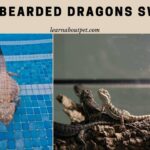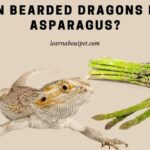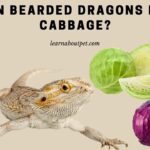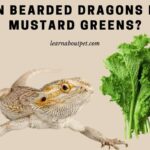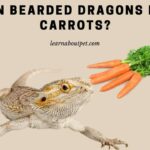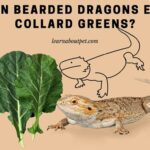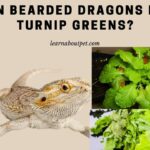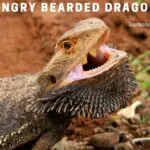Diet of the bearded dragons is important for their health and growth. In captivity, they must be fed the proper amount, at the proper frequency with a quality diet and supplements. Pet owners are worried about their bearded dragon loss of appetite.
Is your bearded dragon not eating? It is accepted that the main reasons for the bearded dragon not eating are changed diets, poor controls of lighting, temperature, and humidity. The bearded dragon may get used to some of these, but some affect its health in any case.
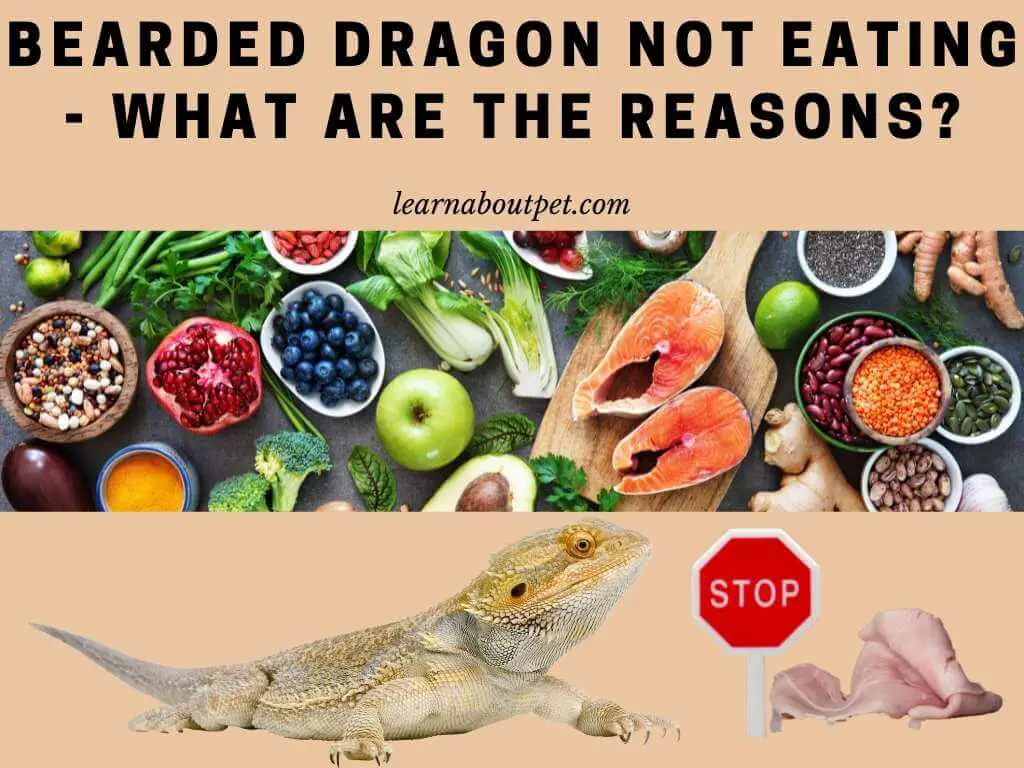
Do Bearded Dragons Eat Everyday?
When the pet owners observe their bearded dragon not eating, they ask how often to feed their beardie. The best recommendations by the specialists and vets are as follows.
- Baby bearded dragons. Feed three to five times a day.
- Juvenile bearded dragons. Feed about two times a day.
- Adult bearded dragons. Feed once a day.
Why Is My Bearded Dragon Not Eating?
When owners see their beardie not eating they are curious to know the reasons for their bearded dragon loss of appetite.
The major reasons for the bearded dragon not eating are listed below. These facts also cover the inquiry why is my baby bearded dragon not eating.
- Stress and fear.
- Relocation or change in environment or surroundings.
- Presence of a new member or another animal.
- Tank Size. A small tank will impact its behavior.
- Hiding place. Improper hide.
- Temperatures. Uncontrolled temperature of the tank.
- Humidity. Uncontrolled humidity in the tank.
- Loud noises.
- Un-clean tank.
- Food. Change, quality, quantity, and timings
- Handling. Too much handling.
- Boredom
When stressed due to any factor they will not eat well or at all. It is reported by pet owner many times that their pet bearded dragon is not eating crickets. This is simply due to boredom. Switch to another insect for some time and then the cricket will be liked again after a few days or weeks.
The beardie will adjust to some of these in time. While lighting and temperature directly affect its digestion and appetite.
Other factors which can contribute to the bearded dragon not eating or bearded dragon not eating enough are
- Getting old
- Impaction or constipation
- Brumation
- Shedding
- Sick
- Injury
- Medication
Bearded dragon not eating or moving much, rather sleeping more is common in brumation period. Bearded dragon not eating while shedding is normal and also could be side effects of medicine being administered.
How Long Can A Bearded Dragon Go Without Eating?
Quite often we hear the question my bearded dragon not eating or the bearded dragon loss of appetite is observed. A bearded dragon can go without food for months.
During their brumation period they don’t eat anything, just come out to drink water and then go to slumber. They slow down their metabolic rate and consume body fat.
A bearded dragon loss of appetite can easily extend for 2 months or so. While juveniles may do less because of their greater energy requirements as they are growing.
How Can I Stimulate My Bearded Dragons Appetite?
Pet owners have reported their bearded dragon not eating enough or their baby bearded dragon not eating much.
If the bearded dragon won’t eat but is active, then discussed below are suggestions on how to feed a bearded dragon that won’t eat.
- First check there are no outside factors affecting its eating habits including sickness. If that is the case, then the beardie is just being picky. Maybe he has developed preference for some foods only.
- Leave the lights on for at least two hours after their last feed as the heat helps in proper digestion. For the same reason in the morning, before they warm up, they will not eat unless their body gets to the right temperature.
- Try a different diet. Eating the same type of greens, the beardie becomes bored. Try to offer some other variety and may flavor it with some unsweetened sauce.
- Hand-feeding. Feed them by hand. Some beardies love to eat from their owner’s hand.
- Worms. Offer a variety of worms and see which it likes most. Try hand-feeding.
- Some pet owners share that they raised their beardie’s curiosity by putting worms (its favorite) under the greens, so the slight movement of the greens really intrigued it to eat.
- Appetite stimulant. One can use some appetite stimulants available commercially. They are herbal, consider them as the last resort. Only to be used for a short-term solution.
- Stand your ground. Do not give up soon. If the beardie is not losing weight, stop giving the insects. The beardie will realize soon that to eat the critters it has to eat the greens also. Sometimes it is hard to break them into submission. Owners report this sort of game continues for weeks till it is tamed.
- Force feed. This is the last option when the beardie has malnourished and advised by the lizard specialist vet.
Is It Normal For A Bearded Dragon To Not Eat For A Day?
It is not normal to skip feed every now and then, Once in a while, an adult beardie may skip his feed. Whereas for juvenile or baby beardies, skipping is not normal, as they need a lot of energy and proteins for growth.
Also a new bearded dragon not eating is a common observation and should not be worried about. You should be more worried if the beardie does not eat for more than a few days, brumation aside.
What Do I Do If My Baby Bearded Dragon Wont Eat?
Beardie owners ask why is my baby bearded dragon not eating. In fact, any new bearded dragon wont eat when brought to a new place.
Whenever a new baby beardie is brought home, it is stressed and the baby bearded dragon won’t eat anything. Experienced owners tell to give some space to the newcomer, so it can adapt to the new environment.
The baby bearded dragon not eating kind of situation can continue for weeks. Observe if it likes your presence. Let it have some solitude.
Meanwhile feed him small crickets, small fruit flies, and wax worms. All these should be very small to make it easy for the baby beardie to swallow.
Give some fruits and treats to increase appetite. Supplement its diet with vitamins and other essential nutrients.
Meantime try to identify the reasons for it being stressed and eliminate them, for the baby beardie to come to normal.
If the situation continues longer, you may have to resort to force-feeding. Take the baby beardie to a lizard specialist vet.
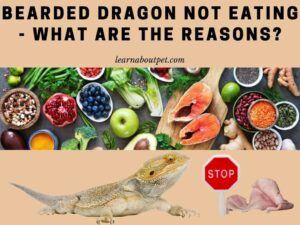
Why Is My Pregnant Bearded Dragon Not Eating?
This is normal. Pregnant bearded dragons will stop eating a few days before laying the first clutch of eggs. It can be ten days also.
They will start eating again after laying eggs. Better give them a lot of proteins and calcium. Which is what is required by their body.
How Do I Know If My Bearded Dragon Is Hungry?
It depends more on the owner to understand their behavior at feed time. They will try to get your attention by some actions.
Owners report their bearded dragon will stare at their empty feed bowl, some will try to eat any leftover green in the corner, some will just stare at their owners, and others will follow with interest their owners preparing meal outside their tank.
How Long Can Juvenile Bearded Dragons Go Without Eating?
One worried pet owner asked my juvenile bearded dragon won’t eat and how long he can sustain.
If there are no signs of sickness, my juvenile bearded dragon won’t eat is a temporary stress sign and will go away in few hours to days.
Juvenile beardies (3 to 8 months) need 2 to 3 feeds a day for their body growth. About 50% of their diet is protein insects etc. Leaving them without food for more than a day is not good.
Although they will not die from one day of hunger but will have an unhealthy effect on their behavior.
Can A Bearded Dragon Go 3 Days Without Eating?
A beardie owner wants to know when bearded dragon not eating, can it easily go without food for a week.
Yes, adult beardies can easily go without food for 3 days or more. However, water should be available at all times. They have a low metabolic rate. Their bodies easily convert fat into energy.
Why Is My Bearded Dragon Not Eating And Sleeping A Lot
Besides the normal and frequent query of bearded dragon not eating, beardie owners ask that why is my bearded dragon not eating and sleeping a lot.
This is simply a case of brumation.
As the surrounding temperatures lower (autumn approaching) the beardies start to go to brumation which is like hibernating for the lizards.
They do not eat but sleep all time. Will only come out of hiding to drink water. Owners need not worry if the bearded dragon won’t eat for this period. When temperatures return to normal, they will be normal.
Baby Bearded Dragon Not Eating And Sleeping A Lot
Pet owners ask what is the reason their baby bearded dragon not eating and sleeping a lot. If it is not any serious injury or illness then it means brumation.
If the temperatures in the tank fall down for a longer period, it will trigger the brumation cycle in the baby bearded dragon.
During this period the owners will see their baby bearded dragon not eating or moving much, only drinking water. It will go in hiding for sleeping for a longer time.
What Can Bearded Dragons Not Eat
Despite the bearded dragon loss of appetite is observed, following food is not recommended for feeding.
- Vegetables.
- Buttercup
- Eggplant
- Garlic
- Iceberg lettuce
- Leeks
- Mushrooms
- Onions
- Rhubarb
- Fruits
- Avocados
- Acidic fruits. All varieties
- High phosphorus and high oxalate vegetables/foods.
- Insects
- Boxelder bugs
- Caterpillars and butterflies
- Fireflies
- Ladybugs
- Venomous insects
- Wild-caught insects
- Any dairy products
How To Force Feed A Bearded Dragon
Force feed is the last stage when bearded dragon not eating for long period and has lost a lot of weight and need to be fed to keep alive.
Vegetables, fruits, worms, liquid nutrients, and vitamins in liquid or paste form are filled in a plastic syringe and gently forced into the beardie’s mouth.
It produces a lot of stress in the beardie. This is to be done with veterinary approval only.
FAQ
Why Is My Bearded Dragon Not Eating Or Pooping?
Bearded dragon not eating is a normal case in brumation. Owners have reported bearded dragon not eating for a month.
With the bearded dragon not eating for a month, it will poop less or very little. It consumes its own body fat during this period.
My Bearded Dragon Won’t Eat But Is Active – Why?
Sometimes people report my bearded dragon won’t eat or bearded dragon not eating much. Refusing to eat is a sure sign of stress.
Besides any injury or sickness, it just could be the beardie is bored of the same diet, or there could be some impaction problem.
Sometimes the beardie goes through an inactive period. If there are no other signs of sickness, there is nothing to worry about. Consult a lizard specialist vet.
Why Is My Bearded Dragon Not Eating Or Moving?
During brumation, the beardie will not eat and sleep in its hide. Moving only to drink water for hydration.
Why Is My Bearded Dragon Not Eating Greens?
This is just out of boredom, eating the same thing every day. Change to other greens and fruits for some time, or add a mixture of different greens.
Final Verdict On Bearded Dragon Not Eating
It is very natural for beardie pet owners to worry when they see their bearded dragon not eating or they observe bearded dragon loss of appetite.

Generally, bearded dragons are tough lizards and when brumating can go without food for months and drinking water sparingly.
However, juvenile and baby beardies have different food requirements as they are growing and need a lot of proteins and energy. Yet they can easily sustain few days without food.
Stress is the main factor that prevents them from eating, besides some other health-related reasons. Relieving the stress-causing factor settles the bearded dragon and it returns to normal soon.
During brumation, they will sleep longer and not eat for many months and only come out to drink water for hydration. In this situation, the owners need not worry about their bearded dragon not eating.

Welcome to Learn About Pet. My name is Rajkumar Ravichandran and I love all pets, travel, and amazing food. I write about my passion and personal experience caring for multiple pets in this blog! ❤️
Post Disclaimer
DISCLAIMER: THIS BLOG OR WEBSITE, "Learn About Pet", DOES NOT PROVIDE YOU WITH MEDICAL ADVICE AND IS NOT A SUBSTITUTE FOR MEDICAL ADVICE. ALWAYS GET IN TOUCH WITH YOUR PERSONAL VETERINARIAN AND USE INFORMATION HERE AS GENERAL ADVICE.
The information, including but not limited to, text, graphics, images and other material contained on this website are for informational purposes only. No material on this site is intended to be a substitute for professional veterinary advice, food recommendation, diagnosis, or treatment. Always seek the advice of your veterinarian or other qualified health care provider with any questions you may have regarding a medical condition or for pet food related questions.
